Generic USB Driver. More...
Detailed Description
Generic USB Driver.
This module implements a generic USB (Universal Serial Bus) driver supporting device-mode operations.
- Precondition
- In order to use the USB driver the
HAL_USE_USBoption must be enabled inhalconf.h.
Driver State Machine
The driver implements a state machine internally, not all the driver functionalities can be used in any moment, any transition not explicitly shown in the following diagram has to be considered an error and shall be captured by an assertion (if enabled).
USB Operations
The USB driver is quite complex and USB is complex in itself, it is recommended to study the USB specification before trying to use the driver.
USB Implementation
The USB driver abstracts the inner details of the underlying USB hardware. The driver works asynchronously and communicates with the application using callbacks. The application is responsible of the descriptors and strings required by the USB device class to be implemented and of the handling of the specific messages sent over the endpoint zero. Standard messages are handled internally to the driver. The application can use hooks in order to handle custom messages or override the handling of the default handling of standard messages.
USB Endpoints
USB endpoints are the objects that the application uses to exchange data with the host. There are two kind of endpoints:
- IN endpoints are used by the application to transmit data to the host.
- OUT endpoints are used by the application to receive data from the host.
The driver invokes a callback after finishing an IN or OUT transaction. States diagram for OUT endpoints in transaction mode:

States diagram for IN endpoints in transaction mode:

USB Callbacks
The USB driver uses callbacks in order to interact with the application. There are several kinds of callbacks to be handled:
- Driver events callback. As example errors, suspend event, reset event etc.
- Messages Hook callback. This hook allows the application to implement handling of custom messages or to override the default handling of standard messages on endpoint zero.
- Descriptor Requested callback. When the driver endpoint zero handler receives a GET DESCRIPTOR message and needs to send a descriptor to the host it queries the application using this callback.
- Start of Frame callback. This callback is invoked each time a SOF packet is received.
- Endpoint callbacks. Each endpoint informs the application about I/O conditions using those callbacks.

Helper macros for USB descriptors | |
| #define | USB_DESC_INDEX(i) |
| Helper macro for index values into descriptor strings. | |
| #define | USB_DESC_BYTE(b) |
| Helper macro for byte values into descriptor strings. | |
| #define | USB_DESC_WORD(w) |
| Helper macro for word values into descriptor strings. | |
| #define | USB_DESC_BCD(bcd) |
| Helper macro for BCD values into descriptor strings. | |
| #define | USB_DESC_DEVICE_SIZE 18U |
| #define | USB_DESC_DEVICE(bcdUSB, bDeviceClass, bDeviceSubClass, bDeviceProtocol, bMaxPacketSize, idVendor, idProduct, bcdDevice, iManufacturer, iProduct, iSerialNumber, bNumConfigurations) |
| Device Descriptor helper macro. | |
| #define | USB_DESC_CONFIGURATION_SIZE 9U |
| Configuration Descriptor size. | |
| #define | USB_DESC_CONFIGURATION(wTotalLength, bNumInterfaces, bConfigurationValue, iConfiguration, bmAttributes, bMaxPower) |
| Configuration Descriptor helper macro. | |
| #define | USB_DESC_INTERFACE_SIZE 9U |
| Interface Descriptor size. | |
| #define | USB_DESC_INTERFACE(bInterfaceNumber, bAlternateSetting, bNumEndpoints, bInterfaceClass, bInterfaceSubClass, bInterfaceProtocol, iInterface) |
| Interface Descriptor helper macro. | |
| #define | USB_DESC_INTERFACE_ASSOCIATION_SIZE 8U |
| Interface Association Descriptor size. | |
| #define | USB_DESC_INTERFACE_ASSOCIATION(bFirstInterface, bInterfaceCount, bFunctionClass, bFunctionSubClass, bFunctionProcotol, iInterface) |
| Interface Association Descriptor helper macro. | |
| #define | USB_DESC_ENDPOINT_SIZE 7U |
| Endpoint Descriptor size. | |
| #define | USB_DESC_ENDPOINT(bEndpointAddress, bmAttributes, wMaxPacketSize, bInterval) |
| Endpoint Descriptor helper macro. | |
Endpoint types and settings | |
| #define | USB_EP_MODE_TYPE 0x0003U |
| #define | USB_EP_MODE_TYPE_CTRL 0x0000U |
| #define | USB_EP_MODE_TYPE_ISOC 0x0001U |
| #define | USB_EP_MODE_TYPE_BULK 0x0002U |
| #define | USB_EP_MODE_TYPE_INTR 0x0003U |
Macro Functions | |
| #define | usbGetDriverStateI(usbp) |
| Returns the driver state. | |
| #define | usbConnectBus(usbp) |
| Connects the USB device. | |
| #define | usbDisconnectBus(usbp) |
| Disconnect the USB device. | |
| #define | usbGetFrameNumberX(usbp) |
| Returns the current frame number. | |
| #define | usbGetTransmitStatusI(usbp, ep) |
| Returns the status of an IN endpoint. | |
| #define | usbGetReceiveStatusI(usbp, ep) |
| Returns the status of an OUT endpoint. | |
| #define | usbGetReceiveTransactionSizeX(usbp, ep) |
| Returns the exact size of a receive transaction. | |
| #define | usbSetupTransfer(usbp, buf, n, endcb) |
| Request transfer setup. | |
| #define | usbReadSetup(usbp, ep, buf) |
| Reads a setup packet from the dedicated packet buffer. | |
Low level driver helper macros | |
| #define | _usb_isr_invoke_event_cb(usbp, evt) |
| Common ISR code, usb event callback. | |
| #define | _usb_isr_invoke_sof_cb(usbp) |
| Common ISR code, SOF callback. | |
| #define | _usb_isr_invoke_setup_cb(usbp, ep) |
| Common ISR code, setup packet callback. | |
| #define | _usb_isr_invoke_in_cb(usbp, ep) |
| Common ISR code, IN endpoint callback. | |
| #define | _usb_isr_invoke_out_cb(usbp, ep) |
| Common ISR code, OUT endpoint event. | |
PLATFORM configuration options | |
| #define | PLATFORM_USB_USE_USB1 FALSE |
| USB driver enable switch. | |
Data Structures | |
| struct | USBDescriptor |
| Type of an USB descriptor. More... | |
| struct | USBInEndpointState |
| Type of an IN endpoint state structure. More... | |
| struct | USBOutEndpointState |
| Type of an OUT endpoint state structure. More... | |
| struct | USBEndpointConfig |
| Type of an USB endpoint configuration structure. More... | |
| struct | USBConfig |
| Type of an USB driver configuration structure. More... | |
| struct | USBDriver |
| Structure representing an USB driver. More... | |
Typedefs | |
| typedef struct USBDriver | USBDriver |
| Type of a structure representing an USB driver. | |
| typedef uint8_t | usbep_t |
| Type of an endpoint identifier. | |
| typedef void(* | usbcallback_t) (USBDriver *usbp) |
| Type of an USB generic notification callback. | |
| typedef void(* | usbepcallback_t) (USBDriver *usbp, usbep_t ep) |
| Type of an USB endpoint callback. | |
| typedef void(* | usbeventcb_t) (USBDriver *usbp, usbevent_t event) |
| Type of an USB event notification callback. | |
| typedef bool(* | usbreqhandler_t) (USBDriver *usbp) |
| Type of a requests handler callback. | |
| typedef const USBDescriptor *(* | usbgetdescriptor_t) (USBDriver *usbp, uint8_t dtype, uint8_t dindex, uint16_t lang) |
| Type of an USB descriptor-retrieving callback. | |
Enumerations | |
| enum | usbstate_t { USB_UNINIT = 0 , USB_STOP = 1 , USB_READY = 2 , USB_SELECTED = 3 , USB_ACTIVE = 4 , USB_SUSPENDED = 5 } |
| Type of a driver state machine possible states. More... | |
| enum | usbepstatus_t { EP_STATUS_DISABLED = 0 , EP_STATUS_STALLED = 1 , EP_STATUS_ACTIVE = 2 } |
| Type of an endpoint status. More... | |
| enum | usbep0state_t { USB_EP0_STP_WAITING = 0U , USB_EP0_IN_TX = USB_IN_STATE | 1U , USB_EP0_IN_WAITING_TX0 = USB_IN_STATE | 2U , USB_EP0_IN_SENDING_STS = USB_IN_STATE | 3U , USB_EP0_OUT_WAITING_STS = USB_OUT_STATE | 4U , USB_EP0_OUT_RX = USB_OUT_STATE | 5U , USB_EP0_ERROR = 6U } |
| Type of an endpoint zero state machine states. More... | |
| enum | usbevent_t { USB_EVENT_RESET = 0 , USB_EVENT_ADDRESS = 1 , USB_EVENT_CONFIGURED = 2 , USB_EVENT_UNCONFIGURED = 3 , USB_EVENT_SUSPEND = 4 , USB_EVENT_WAKEUP = 5 , USB_EVENT_STALLED = 6 } |
| Type of an enumeration of the possible USB events. More... | |
Functions | |
| static uint16_t | get_hword (uint8_t *p) |
| static void | set_address (USBDriver *usbp) |
| SET ADDRESS transaction callback. | |
| static bool | default_handler (USBDriver *usbp) |
| Standard requests handler. | |
| void | usbInit (void) |
| USB Driver initialization. | |
| void | usbObjectInit (USBDriver *usbp) |
Initializes the standard part of a USBDriver structure. | |
| msg_t | usbStart (USBDriver *usbp, const USBConfig *config) |
| Configures and activates the USB peripheral. | |
| void | usbStop (USBDriver *usbp) |
| Deactivates the USB peripheral. | |
| void | usbInitEndpointI (USBDriver *usbp, usbep_t ep, const USBEndpointConfig *epcp) |
| Enables an endpoint. | |
| void | usbDisableEndpointsI (USBDriver *usbp) |
| Disables all the active endpoints. | |
| void | usbStartReceiveI (USBDriver *usbp, usbep_t ep, uint8_t *buf, size_t n) |
| Starts a receive transaction on an OUT endpoint. | |
| void | usbStartTransmitI (USBDriver *usbp, usbep_t ep, const uint8_t *buf, size_t n) |
| Starts a transmit transaction on an IN endpoint. | |
| msg_t | usbReceive (USBDriver *usbp, usbep_t ep, uint8_t *buf, size_t n) |
| Performs a receive transaction on an OUT endpoint. | |
| msg_t | usbTransmit (USBDriver *usbp, usbep_t ep, const uint8_t *buf, size_t n) |
| Performs a transmit transaction on an IN endpoint. | |
| bool | usbStallReceiveI (USBDriver *usbp, usbep_t ep) |
| Stalls an OUT endpoint. | |
| bool | usbStallTransmitI (USBDriver *usbp, usbep_t ep) |
| Stalls an IN endpoint. | |
| void | usbWakeupHost (USBDriver *usbp) |
| Host wake-up procedure. | |
| void | _usb_reset (USBDriver *usbp) |
| USB reset routine. | |
| void | _usb_suspend (USBDriver *usbp) |
| USB suspend routine. | |
| void | _usb_wakeup (USBDriver *usbp) |
| USB wake-up routine. | |
| void | _usb_ep0setup (USBDriver *usbp, usbep_t ep) |
| Default EP0 SETUP callback. | |
| void | _usb_ep0in (USBDriver *usbp, usbep_t ep) |
| Default EP0 IN callback. | |
| void | _usb_ep0out (USBDriver *usbp, usbep_t ep) |
| Default EP0 OUT callback. | |
| void | usbReadSetupI (USBDriver *usbp, usbep_t ep, uint8_t *buf) |
| void | usb_lld_init (void) |
| Low level USB driver initialization. | |
| void | usb_lld_start (USBDriver *usbp) |
| Configures and activates the USB peripheral. | |
| void | usb_lld_stop (USBDriver *usbp) |
| Deactivates the USB peripheral. | |
| void | usb_lld_reset (USBDriver *usbp) |
| USB low level reset routine. | |
| void | usb_lld_set_address (USBDriver *usbp) |
| Sets the USB address. | |
| void | usb_lld_init_endpoint (USBDriver *usbp, usbep_t ep) |
| Enables an endpoint. | |
| void | usb_lld_disable_endpoints (USBDriver *usbp) |
| Disables all the active endpoints except the endpoint zero. | |
| usbepstatus_t | usb_lld_get_status_out (USBDriver *usbp, usbep_t ep) |
| Returns the status of an OUT endpoint. | |
| usbepstatus_t | usb_lld_get_status_in (USBDriver *usbp, usbep_t ep) |
| Returns the status of an IN endpoint. | |
| void | usb_lld_read_setup (USBDriver *usbp, usbep_t ep, uint8_t *buf) |
| Reads a setup packet from the dedicated packet buffer. | |
| void | usb_lld_prepare_receive (USBDriver *usbp, usbep_t ep) |
| Prepares for a receive operation. | |
| void | usb_lld_prepare_transmit (USBDriver *usbp, usbep_t ep) |
| Prepares for a transmit operation. | |
| void | usb_lld_start_out (USBDriver *usbp, usbep_t ep) |
| Starts a receive operation on an OUT endpoint. | |
| void | usb_lld_start_in (USBDriver *usbp, usbep_t ep) |
| Starts a transmit operation on an IN endpoint. | |
| void | usb_lld_stall_out (USBDriver *usbp, usbep_t ep) |
| Brings an OUT endpoint in the stalled state. | |
| void | usb_lld_stall_in (USBDriver *usbp, usbep_t ep) |
| Brings an IN endpoint in the stalled state. | |
| void | usb_lld_clear_out (USBDriver *usbp, usbep_t ep) |
| Brings an OUT endpoint in the active state. | |
| void | usb_lld_clear_in (USBDriver *usbp, usbep_t ep) |
| Brings an IN endpoint in the active state. | |
Variables | |
| static const uint8_t | zero_status [] = {0x00, 0x00} |
| static const uint8_t | active_status [] = {0x00, 0x00} |
| static const uint8_t | halted_status [] = {0x01, 0x00} |
| USBDriver | USBD1 |
| USB1 driver identifier. | |
| union { | |
| USBInEndpointState in | |
| IN EP0 state. More... | |
| USBOutEndpointState out | |
| OUT EP0 state. More... | |
| } | ep0_state |
| EP0 state. | |
| static const USBEndpointConfig | ep0config |
| EP0 initialization structure. | |
Macro Definition Documentation
◆ USB_ENDPOINT_OUT
◆ USB_ENDPOINT_IN
◆ USB_RTYPE_DIR_MASK
| #define USB_RTYPE_DIR_MASK 0x80U |
Definition at line 37 of file hal_usb.h.
Referenced by _usb_ep0setup().
◆ USB_RTYPE_DIR_HOST2DEV
◆ USB_RTYPE_DIR_DEV2HOST
| #define USB_RTYPE_DIR_DEV2HOST 0x80U |
Definition at line 39 of file hal_usb.h.
Referenced by _usb_ep0setup().
◆ USB_RTYPE_TYPE_MASK
| #define USB_RTYPE_TYPE_MASK 0x60U |
Definition at line 40 of file hal_usb.h.
Referenced by _usb_ep0setup(), default_handler(), and sduRequestsHook().
◆ USB_RTYPE_TYPE_STD
| #define USB_RTYPE_TYPE_STD 0x00U |
Definition at line 41 of file hal_usb.h.
Referenced by _usb_ep0setup().
◆ USB_RTYPE_TYPE_CLASS
| #define USB_RTYPE_TYPE_CLASS 0x20U |
Definition at line 42 of file hal_usb.h.
Referenced by sduRequestsHook().
◆ USB_RTYPE_TYPE_VENDOR
◆ USB_RTYPE_TYPE_RESERVED
◆ USB_RTYPE_RECIPIENT_MASK
| #define USB_RTYPE_RECIPIENT_MASK 0x1FU |
Definition at line 45 of file hal_usb.h.
Referenced by default_handler().
◆ USB_RTYPE_RECIPIENT_DEVICE
| #define USB_RTYPE_RECIPIENT_DEVICE 0x00U |
Definition at line 46 of file hal_usb.h.
Referenced by default_handler().
◆ USB_RTYPE_RECIPIENT_INTERFACE
| #define USB_RTYPE_RECIPIENT_INTERFACE 0x01U |
Definition at line 47 of file hal_usb.h.
Referenced by default_handler().
◆ USB_RTYPE_RECIPIENT_ENDPOINT
| #define USB_RTYPE_RECIPIENT_ENDPOINT 0x02U |
Definition at line 48 of file hal_usb.h.
Referenced by default_handler().
◆ USB_RTYPE_RECIPIENT_OTHER
◆ USB_REQ_GET_STATUS
| #define USB_REQ_GET_STATUS 0U |
Definition at line 51 of file hal_usb.h.
Referenced by default_handler().
◆ USB_REQ_CLEAR_FEATURE
| #define USB_REQ_CLEAR_FEATURE 1U |
Definition at line 52 of file hal_usb.h.
Referenced by default_handler().
◆ USB_REQ_SET_FEATURE
| #define USB_REQ_SET_FEATURE 3U |
Definition at line 53 of file hal_usb.h.
Referenced by default_handler().
◆ USB_REQ_SET_ADDRESS
| #define USB_REQ_SET_ADDRESS 5U |
Definition at line 54 of file hal_usb.h.
Referenced by _usb_ep0setup(), and default_handler().
◆ USB_REQ_GET_DESCRIPTOR
| #define USB_REQ_GET_DESCRIPTOR 6U |
Definition at line 55 of file hal_usb.h.
Referenced by default_handler().
◆ USB_REQ_SET_DESCRIPTOR
| #define USB_REQ_SET_DESCRIPTOR 7U |
Definition at line 56 of file hal_usb.h.
Referenced by default_handler().
◆ USB_REQ_GET_CONFIGURATION
| #define USB_REQ_GET_CONFIGURATION 8U |
Definition at line 57 of file hal_usb.h.
Referenced by default_handler().
◆ USB_REQ_SET_CONFIGURATION
| #define USB_REQ_SET_CONFIGURATION 9U |
Definition at line 58 of file hal_usb.h.
Referenced by default_handler().
◆ USB_REQ_GET_INTERFACE
| #define USB_REQ_GET_INTERFACE 10U |
Definition at line 59 of file hal_usb.h.
Referenced by default_handler().
◆ USB_REQ_SET_INTERFACE
| #define USB_REQ_SET_INTERFACE 11U |
Definition at line 60 of file hal_usb.h.
Referenced by default_handler().
◆ USB_REQ_SYNCH_FRAME
| #define USB_REQ_SYNCH_FRAME 12U |
Definition at line 61 of file hal_usb.h.
Referenced by default_handler().
◆ USB_DESCRIPTOR_DEVICE
◆ USB_DESCRIPTOR_CONFIGURATION
◆ USB_DESCRIPTOR_STRING
◆ USB_DESCRIPTOR_INTERFACE
◆ USB_DESCRIPTOR_ENDPOINT
◆ USB_DESCRIPTOR_DEVICE_QUALIFIER
◆ USB_DESCRIPTOR_OTHER_SPEED_CFG
◆ USB_DESCRIPTOR_INTERFACE_POWER
◆ USB_DESCRIPTOR_INTERFACE_ASSOCIATION
◆ USB_FEATURE_ENDPOINT_HALT
| #define USB_FEATURE_ENDPOINT_HALT 0U |
Definition at line 73 of file hal_usb.h.
Referenced by default_handler().
◆ USB_FEATURE_DEVICE_REMOTE_WAKEUP
| #define USB_FEATURE_DEVICE_REMOTE_WAKEUP 1U |
Definition at line 74 of file hal_usb.h.
Referenced by default_handler().
◆ USB_FEATURE_TEST_MODE
◆ USB_EARLY_SET_ADDRESS
◆ USB_LATE_SET_ADDRESS
◆ USB_EP0_STATUS_STAGE_SW
◆ USB_EP0_STATUS_STAGE_HW
◆ USB_SET_ADDRESS_ACK_SW
◆ USB_SET_ADDRESS_ACK_HW
◆ USB_DESC_INDEX
| #define USB_DESC_INDEX | ( | i | ) |
◆ USB_DESC_BYTE
| #define USB_DESC_BYTE | ( | b | ) |
◆ USB_DESC_WORD
| #define USB_DESC_WORD | ( | w | ) |
◆ USB_DESC_BCD
| #define USB_DESC_BCD | ( | bcd | ) |
◆ USB_DESC_DEVICE_SIZE
◆ USB_DESC_DEVICE
| #define USB_DESC_DEVICE | ( | bcdUSB, | |
| bDeviceClass, | |||
| bDeviceSubClass, | |||
| bDeviceProtocol, | |||
| bMaxPacketSize, | |||
| idVendor, | |||
| idProduct, | |||
| bcdDevice, | |||
| iManufacturer, | |||
| iProduct, | |||
| iSerialNumber, | |||
| bNumConfigurations ) |
Device Descriptor helper macro.
◆ USB_DESC_CONFIGURATION_SIZE
| #define USB_DESC_CONFIGURATION_SIZE 9U |
◆ USB_DESC_CONFIGURATION
| #define USB_DESC_CONFIGURATION | ( | wTotalLength, | |
| bNumInterfaces, | |||
| bConfigurationValue, | |||
| iConfiguration, | |||
| bmAttributes, | |||
| bMaxPower ) |
Configuration Descriptor helper macro.
◆ USB_DESC_INTERFACE_SIZE
| #define USB_DESC_INTERFACE_SIZE 9U |
◆ USB_DESC_INTERFACE
| #define USB_DESC_INTERFACE | ( | bInterfaceNumber, | |
| bAlternateSetting, | |||
| bNumEndpoints, | |||
| bInterfaceClass, | |||
| bInterfaceSubClass, | |||
| bInterfaceProtocol, | |||
| iInterface ) |
Interface Descriptor helper macro.
◆ USB_DESC_INTERFACE_ASSOCIATION_SIZE
| #define USB_DESC_INTERFACE_ASSOCIATION_SIZE 8U |
◆ USB_DESC_INTERFACE_ASSOCIATION
| #define USB_DESC_INTERFACE_ASSOCIATION | ( | bFirstInterface, | |
| bInterfaceCount, | |||
| bFunctionClass, | |||
| bFunctionSubClass, | |||
| bFunctionProcotol, | |||
| iInterface ) |
Interface Association Descriptor helper macro.
◆ USB_DESC_ENDPOINT_SIZE
| #define USB_DESC_ENDPOINT_SIZE 7U |
◆ USB_DESC_ENDPOINT
| #define USB_DESC_ENDPOINT | ( | bEndpointAddress, | |
| bmAttributes, | |||
| wMaxPacketSize, | |||
| bInterval ) |
Endpoint Descriptor helper macro.
◆ USB_EP_MODE_TYPE
◆ USB_EP_MODE_TYPE_CTRL
◆ USB_EP_MODE_TYPE_ISOC
| #define USB_EP_MODE_TYPE_ISOC 0x0001U |
◆ USB_EP_MODE_TYPE_BULK
◆ USB_EP_MODE_TYPE_INTR
◆ USB_IN_STATE
◆ USB_OUT_STATE
◆ USB_USE_WAIT
| #define USB_USE_WAIT FALSE |
◆ usbGetDriverStateI
| #define usbGetDriverStateI | ( | usbp | ) |
Returns the driver state.
- Parameters
-
[in] usbp pointer to the USBDriverobject
- Returns
- The driver state.
- Function Class:
- This is an I-Class API, this function can be invoked from within a system lock zone by both threads and interrupt handlers.
Definition at line 391 of file hal_usb.h.
Referenced by obnotify(), sdu_start_receive(), sduSOFHookI(), usbReceive(), and usbTransmit().
◆ usbConnectBus
| #define usbConnectBus | ( | usbp | ) |
Connects the USB device.
- Parameters
-
[in] usbp pointer to the USBDriverobject
- Function Class:
- Normal API, this function can be invoked by regular system threads but not from within a lock zone.
◆ usbDisconnectBus
| #define usbDisconnectBus | ( | usbp | ) |
Disconnect the USB device.
- Parameters
-
[in] usbp pointer to the USBDriverobject
- Function Class:
- Normal API, this function can be invoked by regular system threads but not from within a lock zone.
◆ usbGetFrameNumberX
| #define usbGetFrameNumberX | ( | usbp | ) |
Returns the current frame number.
- Parameters
-
[in] usbp pointer to the USBDriverobject
- Returns
- The current frame number.
- Function Class:
- This is an X-Class API, this function can be invoked from any context.
◆ usbGetTransmitStatusI
| #define usbGetTransmitStatusI | ( | usbp, | |
| ep ) |
Returns the status of an IN endpoint.
- Parameters
-
[in] usbp pointer to the USBDriverobject[in] ep endpoint number
- Returns
- The operation status.
- Return values
-
false Endpoint ready. true Endpoint transmitting.
- Function Class:
- This is an I-Class API, this function can be invoked from within a system lock zone by both threads and interrupt handlers.
Definition at line 432 of file hal_usb.h.
Referenced by obnotify(), sduSOFHookI(), usbStallTransmitI(), and usbStartTransmitI().
◆ usbGetReceiveStatusI
| #define usbGetReceiveStatusI | ( | usbp, | |
| ep ) |
Returns the status of an OUT endpoint.
- Parameters
-
[in] usbp pointer to the USBDriverobject[in] ep endpoint number
- Returns
- The operation status.
- Return values
-
false Endpoint ready. true Endpoint receiving.
- Function Class:
- This is an I-Class API, this function can be invoked from within a system lock zone by both threads and interrupt handlers.
Definition at line 446 of file hal_usb.h.
Referenced by sdu_start_receive(), usbStallReceiveI(), and usbStartReceiveI().
◆ usbGetReceiveTransactionSizeX
| #define usbGetReceiveTransactionSizeX | ( | usbp, | |
| ep ) |
Returns the exact size of a receive transaction.
The received size can be different from the size specified in usbStartReceiveI() because the last packet could have a size different from the expected one.
- Parameters
-
[in] usbp pointer to the USBDriverobject[in] ep endpoint number
- Returns
- Received data size.
- Function Class:
- This is an X-Class API, this function can be invoked from any context.
Definition at line 461 of file hal_usb.h.
Referenced by _usb_ep0out(), and sduDataReceived().
◆ usbSetupTransfer
| #define usbSetupTransfer | ( | usbp, | |
| buf, | |||
| n, | |||
| endcb ) |
Request transfer setup.
This macro is used by the request handling callbacks in order to prepare a transaction over the endpoint zero.
- Parameters
-
[in] usbp pointer to the USBDriverobject[in] buf pointer to a buffer for the transaction data [in] n number of bytes to be transferred [in] endcb callback to be invoked after the transfer or NULL
- Function Class:
- Special function, this function has special requirements see the notes.
Definition at line 476 of file hal_usb.h.
Referenced by default_handler(), and sduRequestsHook().
◆ usbReadSetup
| #define usbReadSetup | ( | usbp, | |
| ep, | |||
| buf ) |
Reads a setup packet from the dedicated packet buffer.
This function must be invoked in the context of the setup_cb callback in order to read the received setup packet.
- Precondition
- In order to use this function the endpoint must have been initialized as a control endpoint.
- Note
- This function can be invoked both in thread and IRQ context.
- Parameters
-
[in] usbp pointer to the USBDriverobject[in] ep endpoint number [out] buf buffer where to copy the packet data
- Function Class:
- Special function, this function has special requirements see the notes.
Definition at line 496 of file hal_usb.h.
Referenced by _usb_ep0setup().
◆ _usb_isr_invoke_event_cb
| #define _usb_isr_invoke_event_cb | ( | usbp, | |
| evt ) |
Common ISR code, usb event callback.
- Parameters
-
[in] usbp pointer to the USBDriverobject[in] evt USB event code
- Function Class:
- Not an API, this function is for internal use only.
Definition at line 511 of file hal_usb.h.
Referenced by _usb_ep0in(), _usb_ep0out(), _usb_ep0setup(), _usb_reset(), _usb_suspend(), _usb_wakeup(), default_handler(), and set_address().
◆ _usb_isr_invoke_sof_cb
| #define _usb_isr_invoke_sof_cb | ( | usbp | ) |
◆ _usb_isr_invoke_setup_cb
| #define _usb_isr_invoke_setup_cb | ( | usbp, | |
| ep ) |
◆ _usb_isr_invoke_in_cb
| #define _usb_isr_invoke_in_cb | ( | usbp, | |
| ep ) |
Common ISR code, IN endpoint callback.
- Parameters
-
[in] usbp pointer to the USBDriverobject[in] ep endpoint number
- Function Class:
- Not an API, this function is for internal use only.
◆ _usb_isr_invoke_out_cb
| #define _usb_isr_invoke_out_cb | ( | usbp, | |
| ep ) |
Common ISR code, OUT endpoint event.
- Parameters
-
[in] usbp pointer to the USBDriverobject[in] ep endpoint number
- Function Class:
- Not an API, this function is for internal use only.
◆ USB_MAX_ENDPOINTS
| #define USB_MAX_ENDPOINTS 4 |
Maximum endpoint address.
Definition at line 37 of file hal_usb_lld.h.
Referenced by _usb_reset(), _usb_suspend(), usbDisableEndpointsI(), usbObjectInit(), usbStart(), usbStartReceiveI(), usbStartTransmitI(), and usbStop().
◆ USB_EP0_STATUS_STAGE
| #define USB_EP0_STATUS_STAGE USB_EP0_STATUS_STAGE_SW |
Status stage handling method.
Definition at line 42 of file hal_usb_lld.h.
◆ USB_SET_ADDRESS_MODE
| #define USB_SET_ADDRESS_MODE USB_LATE_SET_ADDRESS |
The address can be changed immediately upon packet reception.
Definition at line 47 of file hal_usb_lld.h.
◆ USB_SET_ADDRESS_ACK_HANDLING
| #define USB_SET_ADDRESS_ACK_HANDLING USB_SET_ADDRESS_ACK_SW |
Method for set address acknowledge.
Definition at line 52 of file hal_usb_lld.h.
◆ PLATFORM_USB_USE_USB1
| #define PLATFORM_USB_USE_USB1 FALSE |
USB driver enable switch.
If set to TRUE the support for USB1 is included.
- Note
- The default is
FALSE.
Definition at line 68 of file hal_usb_lld.h.
◆ usb_lld_get_frame_number
| #define usb_lld_get_frame_number | ( | usbp | ) |
Returns the current frame number.
- Parameters
-
[in] usbp pointer to the USBDriverobject
- Returns
- The current frame number.
- Function Class:
- Not an API, this function is for internal use only.
Definition at line 306 of file hal_usb_lld.h.
◆ usb_lld_get_transaction_size
| #define usb_lld_get_transaction_size | ( | usbp, | |
| ep ) |
Returns the exact size of a receive transaction.
The received size can be different from the size specified in usbStartReceiveI() because the last packet could have a size different from the expected one.
- Precondition
- The OUT endpoint must have been configured in transaction mode in order to use this function.
- Parameters
-
[in] usbp pointer to the USBDriverobject[in] ep endpoint number
- Returns
- Received data size.
- Function Class:
- Not an API, this function is for internal use only.
Definition at line 322 of file hal_usb_lld.h.
◆ usb_lld_connect_bus
| #define usb_lld_connect_bus | ( | usbp | ) |
Connects the USB device.
- Function Class:
- Normal API, this function can be invoked by regular system threads but not from within a lock zone.
Definition at line 330 of file hal_usb_lld.h.
◆ usb_lld_disconnect_bus
| #define usb_lld_disconnect_bus | ( | usbp | ) |
Disconnect the USB device.
- Function Class:
- Normal API, this function can be invoked by regular system threads but not from within a lock zone.
Definition at line 337 of file hal_usb_lld.h.
◆ usb_lld_wakeup_host
| #define usb_lld_wakeup_host | ( | usbp | ) |
Start of host wake-up procedure.
- Function Class:
- Not an API, this function is for internal use only.
Definition at line 344 of file hal_usb_lld.h.
Referenced by usbWakeupHost().
Typedef Documentation
◆ USBDriver
| typedef struct USBDriver USBDriver |
◆ usbep_t
◆ usbcallback_t
| typedef void(* usbcallback_t) (USBDriver *usbp) |
◆ usbepcallback_t
◆ usbeventcb_t
| typedef void(* usbeventcb_t) (USBDriver *usbp, usbevent_t event) |
◆ usbreqhandler_t
| typedef bool(* usbreqhandler_t) (USBDriver *usbp) |
Type of a requests handler callback.
The request is encoded in the usb_setup buffer.
- Parameters
-
[in] usbp pointer to the USBDriverobject triggering the callback
- Returns
- The request handling exit code.
- Return values
-
false Request not recognized by the handler. true Request handled.
◆ usbgetdescriptor_t
| typedef const USBDescriptor *(* usbgetdescriptor_t) (USBDriver *usbp, uint8_t dtype, uint8_t dindex, uint16_t lang) |
Enumeration Type Documentation
◆ usbstate_t
| enum usbstate_t |
◆ usbepstatus_t
| enum usbepstatus_t |
◆ usbep0state_t
| enum usbep0state_t |
Type of an endpoint zero state machine states.
◆ usbevent_t
| enum usbevent_t |
Type of an enumeration of the possible USB events.
Function Documentation
◆ get_hword()
|
static |
Definition at line 51 of file hal_usb.c.
Referenced by _usb_ep0in(), _usb_ep0setup(), and default_handler().
◆ set_address()
|
static |
SET ADDRESS transaction callback.
- Parameters
-
[in] usbp pointer to the USBDriverobject
Definition at line 64 of file hal_usb.c.
References _usb_isr_invoke_event_cb, USBDriver::address, USBDriver::setup, USBDriver::state, USB_EVENT_ADDRESS, usb_lld_set_address(), and USB_SELECTED.
Referenced by default_handler().

◆ default_handler()
|
static |
Standard requests handler.
This is the standard requests default handler, most standard requests are handled here, the user can override the standard handling using the requests_hook_cb hook in the USBConfig structure.
- Parameters
-
[in] usbp pointer to the USBDriverobject
- Returns
- The request handling exit code.
- Return values
-
false Request not recognized by the handler or error. true Request handled.
Definition at line 84 of file hal_usb.c.
References _usb_isr_invoke_event_cb, active_status, USBDriver::config, USBDriver::configuration, EP_STATUS_ACTIVE, EP_STATUS_DISABLED, EP_STATUS_STALLED, USBConfig::get_descriptor_cb, get_hword(), halted_status, osalSysLockFromISR(), osalSysUnlockFromISR(), set_address(), USBDriver::setup, USBDriver::state, USBDriver::status, USBDescriptor::ud_size, USBDescriptor::ud_string, USB_ACTIVE, USB_EVENT_CONFIGURED, USB_EVENT_UNCONFIGURED, USB_FEATURE_DEVICE_REMOTE_WAKEUP, USB_FEATURE_ENDPOINT_HALT, usb_lld_clear_in(), usb_lld_clear_out(), usb_lld_get_status_in(), usb_lld_get_status_out(), usb_lld_stall_in(), usb_lld_stall_out(), USB_REQ_CLEAR_FEATURE, USB_REQ_GET_CONFIGURATION, USB_REQ_GET_DESCRIPTOR, USB_REQ_GET_INTERFACE, USB_REQ_GET_STATUS, USB_REQ_SET_ADDRESS, USB_REQ_SET_CONFIGURATION, USB_REQ_SET_DESCRIPTOR, USB_REQ_SET_FEATURE, USB_REQ_SET_INTERFACE, USB_REQ_SYNCH_FRAME, USB_RTYPE_RECIPIENT_DEVICE, USB_RTYPE_RECIPIENT_ENDPOINT, USB_RTYPE_RECIPIENT_INTERFACE, USB_RTYPE_RECIPIENT_MASK, USB_RTYPE_TYPE_MASK, USB_SELECTED, usbDisableEndpointsI(), usbSetupTransfer, and zero_status.
Referenced by _usb_ep0setup().
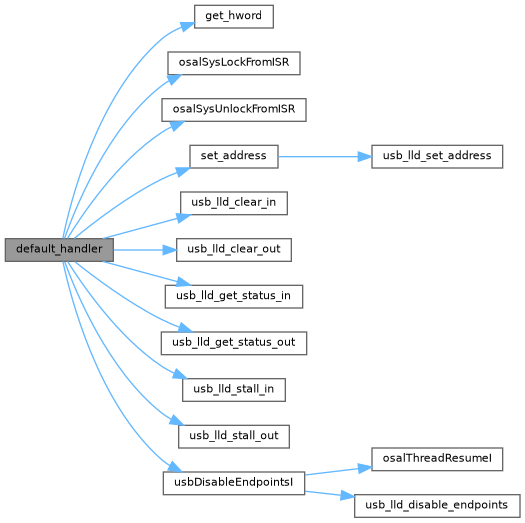
◆ usbInit()
| void usbInit | ( | void | ) |
USB Driver initialization.
- Note
- This function is implicitly invoked by
halInit(), there is no need to explicitly initialize the driver.
- Function Class:
- Object or module nitializer function.
Definition at line 270 of file hal_usb.c.
References usb_lld_init().
Referenced by halInit().

◆ usbObjectInit()
| void usbObjectInit | ( | USBDriver * | usbp | ) |
Initializes the standard part of a USBDriver structure.
- Parameters
-
[out] usbp pointer to the USBDriverobject
- Function Class:
- Object or module nitializer function.
Definition at line 282 of file hal_usb.c.
References USBDriver::config, USBDriver::in_params, USBDriver::out_params, USBDriver::receiving, USBDriver::state, USBDriver::transmitting, USB_MAX_ENDPOINTS, and USB_STOP.
Referenced by usb_lld_init().
◆ usbStart()
Configures and activates the USB peripheral.
- Returns
- The operation status.
- Function Class:
- Normal API, this function can be invoked by regular system threads but not from within a lock zone.
Definition at line 304 of file hal_usb.c.
References USBDriver::config, USBDriver::epc, HAL_RET_SUCCESS, osalDbgAssert, osalDbgCheck, osalSysLock(), osalSysUnlock(), USBDriver::state, usb_lld_start(), USB_MAX_ENDPOINTS, USB_READY, and USB_STOP.
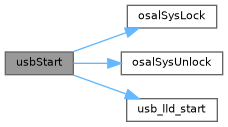
◆ usbStop()
| void usbStop | ( | USBDriver * | usbp | ) |
Deactivates the USB peripheral.
- Parameters
-
[in] usbp pointer to the USBDriverobject
- Function Class:
- Normal API, this function can be invoked by regular system threads but not from within a lock zone.
Definition at line 345 of file hal_usb.c.
References USBDriver::config, USBDriver::epc, USBEndpointConfig::in_state, MSG_RESET, osalDbgAssert, osalDbgCheck, osalOsRescheduleS(), osalSysLock(), osalSysUnlock(), osalThreadResumeI(), USBEndpointConfig::out_state, USBDriver::state, USBInEndpointState::thread, USBOutEndpointState::thread, USB_ACTIVE, usb_lld_stop(), USB_MAX_ENDPOINTS, USB_READY, USB_SELECTED, USB_STOP, and USB_SUSPENDED.
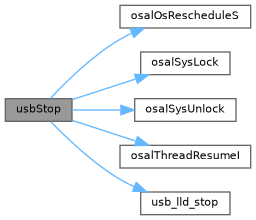
◆ usbInitEndpointI()
| void usbInitEndpointI | ( | USBDriver * | usbp, |
| usbep_t | ep, | ||
| const USBEndpointConfig * | epcp ) |
Enables an endpoint.
This function enables an endpoint, both IN and/or OUT directions depending on the configuration structure.
- Note
- This function must be invoked in response of a SET_CONFIGURATION or SET_INTERFACE message.
- Parameters
-
[in] usbp pointer to the USBDriverobject[in] ep endpoint number [in] epcp the endpoint configuration
- Function Class:
- This is an I-Class API, this function can be invoked from within a system lock zone by both threads and interrupt handlers.
Definition at line 393 of file hal_usb.c.
References USBDriver::epc, USBEndpointConfig::in_state, osalDbgAssert, osalDbgCheck, osalDbgCheckClassI, USBEndpointConfig::out_state, USBDriver::state, USB_ACTIVE, and usb_lld_init_endpoint().

◆ usbDisableEndpointsI()
| void usbDisableEndpointsI | ( | USBDriver * | usbp | ) |
Disables all the active endpoints.
This function disables all the active endpoints except the endpoint zero.
- Note
- This function must be invoked in response of a SET_CONFIGURATION message with configuration number zero.
- Parameters
-
[in] usbp pointer to the USBDriverobject
- Function Class:
- This is an I-Class API, this function can be invoked from within a system lock zone by both threads and interrupt handlers.
Definition at line 428 of file hal_usb.c.
References USBDriver::epc, USBEndpointConfig::in_state, MSG_RESET, osalDbgAssert, osalDbgCheck, osalDbgCheckClassI, osalThreadResumeI(), USBEndpointConfig::out_state, USBDriver::receiving, USBDriver::state, USBInEndpointState::thread, USBOutEndpointState::thread, USBDriver::transmitting, USB_ACTIVE, usb_lld_disable_endpoints(), and USB_MAX_ENDPOINTS.
Referenced by default_handler().

◆ usbStartReceiveI()
Starts a receive transaction on an OUT endpoint.
- Note
- This function is meant to be called from ISR context outside critical zones because there is a potentially slow operation inside.
-
The transaction terminates when one of the following conditions has been met:
- The specified amount of data has been received.
- A short packet has been received.
- A zero-lenght packet has been received.
- The USB has been reset by host or the driver went into
USB_SUSPENDEDstate.
- Parameters
-
[in] usbp pointer to the USBDriverobject[in] ep endpoint number [out] buf buffer where to copy the received data [in] n transaction size. It is recommended a multiple of the packet size because the excess is discarded.
- Function Class:
- This is an I-Class API, this function can be invoked from within a system lock zone by both threads and interrupt handlers.
Definition at line 479 of file hal_usb.c.
References USBDriver::epc, osalDbgAssert, osalDbgCheck, osalDbgCheckClassI, USBEndpointConfig::out_state, USBDriver::receiving, USBOutEndpointState::rxbuf, USBOutEndpointState::rxcnt, USBOutEndpointState::rxsize, USBOutEndpointState::thread, usb_lld_start_out(), USB_MAX_ENDPOINTS, and usbGetReceiveStatusI.
Referenced by _usb_ep0in(), _usb_ep0setup(), sdu_start_receive(), and usbReceive().

◆ usbStartTransmitI()
Starts a transmit transaction on an IN endpoint.
- Note
- This function is meant to be called from ISR context outside critical zones because there is a potentially slow operation inside.
- Parameters
-
[in] usbp pointer to the USBDriverobject[in] ep endpoint number [in] buf buffer where to fetch the data to be transmitted [in] n transaction size
- Function Class:
- This is an I-Class API, this function can be invoked from within a system lock zone by both threads and interrupt handlers.
Definition at line 518 of file hal_usb.c.
References USBDriver::epc, USBEndpointConfig::in_state, osalDbgAssert, osalDbgCheck, osalDbgCheckClassI, USBInEndpointState::thread, USBDriver::transmitting, USBInEndpointState::txbuf, USBInEndpointState::txcnt, USBInEndpointState::txsize, usb_lld_start_in(), USB_MAX_ENDPOINTS, and usbGetTransmitStatusI.
Referenced by _usb_ep0in(), _usb_ep0out(), _usb_ep0setup(), obnotify(), sduDataTransmitted(), sduSOFHookI(), and usbTransmit().

◆ usbReceive()
Performs a receive transaction on an OUT endpoint.
- Note
- The transaction terminates when one of the following conditions has been met:
- The specified amount of data has been received.
- A short packet has been received.
- A zero-lenght packet has been received.
- The USB has been reset by host or the driver went into
USB_SUSPENDEDstate.
- Parameters
-
[in] usbp pointer to the USBDriverobject[in] ep endpoint number [out] buf buffer where to copy the received data [in] n transaction size. It is recommended a multiple of the packet size because the excess is discarded.
- Returns
- The received effective data size, it can be less than the amount specified.
- Return values
-
MSG_RESET driver not in USB_ACTIVEstate or the operation has been aborted by an USB reset or a transition to theUSB_SUSPENDEDstate.
- Function Class:
- Normal API, this function can be invoked by regular system threads but not from within a lock zone.
Definition at line 569 of file hal_usb.c.
References USBDriver::epc, MSG_RESET, osalSysLock(), osalSysUnlock(), osalThreadSuspendS(), USBEndpointConfig::out_state, USBOutEndpointState::thread, USB_ACTIVE, usbGetDriverStateI, and usbStartReceiveI().
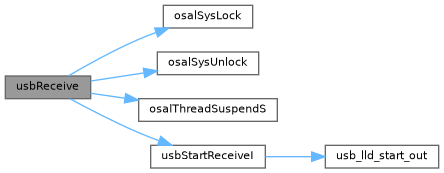
◆ usbTransmit()
Performs a transmit transaction on an IN endpoint.
- Parameters
-
[in] usbp pointer to the USBDriverobject[in] ep endpoint number [in] buf buffer where to fetch the data to be transmitted [in] n transaction size
- Returns
- The operation status.
- Return values
-
MSG_OK operation performed successfully. MSG_RESET driver not in USB_ACTIVEstate or the operation has been aborted by an USB reset or a transition to theUSB_SUSPENDEDstate.
- Function Class:
- Normal API, this function can be invoked by regular system threads but not from within a lock zone.
Definition at line 602 of file hal_usb.c.
References USBDriver::epc, USBEndpointConfig::in_state, MSG_RESET, osalSysLock(), osalSysUnlock(), osalThreadSuspendS(), USBInEndpointState::thread, USB_ACTIVE, usbGetDriverStateI, and usbStartTransmitI().
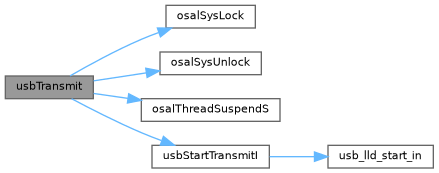
◆ usbStallReceiveI()
Stalls an OUT endpoint.
- Parameters
-
[in] usbp pointer to the USBDriverobject[in] ep endpoint number
- Returns
- The operation status.
- Return values
-
false Endpoint stalled. true Endpoint busy, not stalled.
- Function Class:
- This is an I-Class API, this function can be invoked from within a system lock zone by both threads and interrupt handlers.
Definition at line 632 of file hal_usb.c.
References osalDbgCheck, osalDbgCheckClassI, usb_lld_stall_out(), and usbGetReceiveStatusI.

◆ usbStallTransmitI()
Stalls an IN endpoint.
- Parameters
-
[in] usbp pointer to the USBDriverobject[in] ep endpoint number
- Returns
- The operation status.
- Return values
-
false Endpoint stalled. true Endpoint busy, not stalled.
- Function Class:
- This is an I-Class API, this function can be invoked from within a system lock zone by both threads and interrupt handlers.
Definition at line 657 of file hal_usb.c.
References osalDbgCheck, osalDbgCheckClassI, usb_lld_stall_in(), and usbGetTransmitStatusI.

◆ usbWakeupHost()
| void usbWakeupHost | ( | USBDriver * | usbp | ) |
Host wake-up procedure.
- Note
- It is silently ignored if the USB device is not in the
USB_SUSPENDEDstate.
- Parameters
-
[in] usbp pointer to the USBDriverobject
- Function Class:
- Normal API, this function can be invoked by regular system threads but not from within a lock zone.
Definition at line 679 of file hal_usb.c.
References USBDriver::state, usb_lld_wakeup_host, and USB_SUSPENDED.
◆ _usb_reset()
| void _usb_reset | ( | USBDriver * | usbp | ) |
USB reset routine.
This function must be invoked when an USB bus reset condition is detected.
- Parameters
-
[in] usbp pointer to the USBDriverobject
- Function Class:
- Not an API, this function is for internal use only.
Definition at line 696 of file hal_usb.c.
References _usb_isr_invoke_event_cb, USBDriver::address, USBDriver::configuration, USBDriver::ep0state, USBDriver::epc, USBEndpointConfig::in_state, MSG_RESET, osalSysLockFromISR(), osalSysUnlockFromISR(), osalThreadResumeI(), USBEndpointConfig::out_state, USBDriver::receiving, USBDriver::state, USBDriver::status, USBInEndpointState::thread, USBOutEndpointState::thread, USBDriver::transmitting, USB_EP0_STP_WAITING, USB_EVENT_RESET, usb_lld_reset(), USB_MAX_ENDPOINTS, and USB_READY.
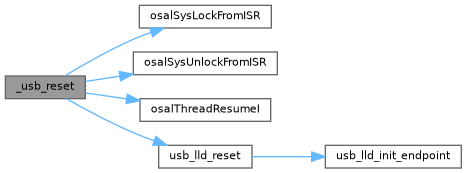
◆ _usb_suspend()
| void _usb_suspend | ( | USBDriver * | usbp | ) |
USB suspend routine.
This function must be invoked when an USB bus suspend condition is detected.
- Parameters
-
[in] usbp pointer to the USBDriverobject
- Function Class:
- Not an API, this function is for internal use only.
Definition at line 746 of file hal_usb.c.
References _usb_isr_invoke_event_cb, USBDriver::epc, USBEndpointConfig::in_state, MSG_RESET, osalSysLockFromISR(), osalSysUnlockFromISR(), osalThreadResumeI(), USBEndpointConfig::out_state, USBDriver::receiving, USBDriver::saved_state, USBDriver::state, USBInEndpointState::thread, USBOutEndpointState::thread, USBDriver::transmitting, USB_EVENT_SUSPEND, USB_MAX_ENDPOINTS, and USB_SUSPENDED.
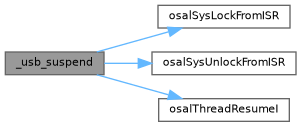
◆ _usb_wakeup()
| void _usb_wakeup | ( | USBDriver * | usbp | ) |
USB wake-up routine.
This function must be invoked when an USB bus wake-up condition is detected.
- Parameters
-
[in] usbp pointer to the USBDriverobject
- Function Class:
- Not an API, this function is for internal use only.
Definition at line 793 of file hal_usb.c.
References _usb_isr_invoke_event_cb, USBDriver::saved_state, USBDriver::state, USB_EVENT_WAKEUP, and USB_SUSPENDED.
◆ _usb_ep0setup()
Default EP0 SETUP callback.
This function is used by the low level driver as default handler for EP0 SETUP events.
- Parameters
-
[in] usbp pointer to the USBDriverobject[in] ep endpoint number, always zero
- Function Class:
- Not an API, this function is for internal use only.
Definition at line 816 of file hal_usb.c.
References _usb_isr_invoke_event_cb, USBDriver::config, default_handler(), USBDriver::ep0n, USBDriver::ep0next, USBDriver::ep0state, get_hword(), osalSysLockFromISR(), osalSysUnlockFromISR(), USBConfig::requests_hook_cb, USBDriver::setup, USB_EP0_ERROR, USB_EP0_IN_SENDING_STS, USB_EP0_IN_TX, USB_EP0_OUT_RX, USB_EP0_OUT_WAITING_STS, USB_EP0_STP_WAITING, USB_EVENT_STALLED, usb_lld_stall_in(), usb_lld_stall_out(), USB_REQ_SET_ADDRESS, USB_RTYPE_DIR_DEV2HOST, USB_RTYPE_DIR_MASK, USB_RTYPE_TYPE_MASK, USB_RTYPE_TYPE_STD, usbReadSetup, usbStartReceiveI(), and usbStartTransmitI().
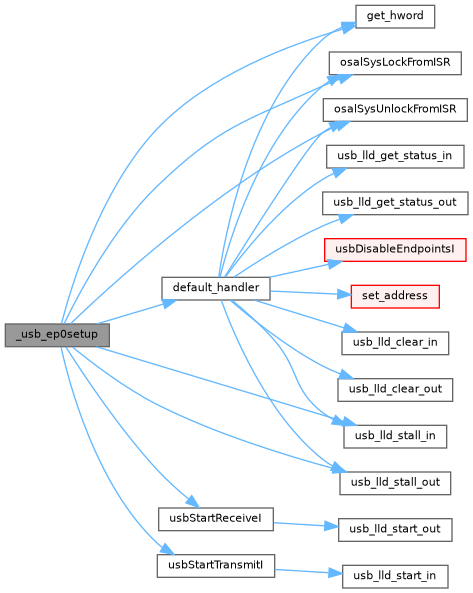
◆ _usb_ep0in()
Default EP0 IN callback.
This function is used by the low level driver as default handler for EP0 IN events.
- Parameters
-
[in] usbp pointer to the USBDriverobject[in] ep endpoint number, always zero
- Function Class:
- Not an API, this function is for internal use only.
Definition at line 924 of file hal_usb.c.
References _usb_isr_invoke_event_cb, USBDriver::ep0endcb, USBDriver::ep0n, USBDriver::ep0state, USBDriver::epc, get_hword(), USBEndpointConfig::in_maxsize, osalDbgAssert, osalSysLockFromISR(), osalSysUnlockFromISR(), USBDriver::setup, USB_EP0_ERROR, USB_EP0_IN_SENDING_STS, USB_EP0_IN_TX, USB_EP0_IN_WAITING_TX0, USB_EP0_OUT_RX, USB_EP0_OUT_WAITING_STS, USB_EP0_STP_WAITING, USB_EVENT_STALLED, usb_lld_stall_in(), usb_lld_stall_out(), usbStartReceiveI(), and usbStartTransmitI().

◆ _usb_ep0out()
Default EP0 OUT callback.
This function is used by the low level driver as default handler for EP0 OUT events.
- Parameters
-
[in] usbp pointer to the USBDriverobject[in] ep endpoint number, always zero
- Function Class:
- Not an API, this function is for internal use only.
Definition at line 991 of file hal_usb.c.
References _usb_isr_invoke_event_cb, USBDriver::ep0endcb, USBDriver::ep0state, osalDbgAssert, osalSysLockFromISR(), osalSysUnlockFromISR(), USB_EP0_ERROR, USB_EP0_IN_SENDING_STS, USB_EP0_IN_TX, USB_EP0_IN_WAITING_TX0, USB_EP0_OUT_RX, USB_EP0_OUT_WAITING_STS, USB_EP0_STP_WAITING, USB_EVENT_STALLED, usb_lld_stall_in(), usb_lld_stall_out(), usbGetReceiveTransactionSizeX, and usbStartTransmitI().

◆ usbReadSetupI()
◆ usb_lld_init()
| void usb_lld_init | ( | void | ) |
Low level USB driver initialization.
- Function Class:
- Not an API, this function is for internal use only.
Definition at line 99 of file hal_usb_lld.c.
References USBD1, and usbObjectInit().
Referenced by usbInit().

◆ usb_lld_start()
| void usb_lld_start | ( | USBDriver * | usbp | ) |
Configures and activates the USB peripheral.
- Parameters
-
[in] usbp pointer to the USBDriverobject
- Function Class:
- Not an API, this function is for internal use only.
Definition at line 114 of file hal_usb_lld.c.
References USBDriver::state, USB_STOP, and USBD1.
Referenced by usbStart().
◆ usb_lld_stop()
| void usb_lld_stop | ( | USBDriver * | usbp | ) |
Deactivates the USB peripheral.
- Parameters
-
[in] usbp pointer to the USBDriverobject
- Function Class:
- Not an API, this function is for internal use only.
Definition at line 135 of file hal_usb_lld.c.
References USBDriver::state, USB_READY, and USBD1.
Referenced by usbStop().
◆ usb_lld_reset()
| void usb_lld_reset | ( | USBDriver * | usbp | ) |
USB low level reset routine.
- Parameters
-
[in] usbp pointer to the USBDriverobject
- Function Class:
- Not an API, this function is for internal use only.
Definition at line 156 of file hal_usb_lld.c.
References ep0config, USBDriver::epc, and usb_lld_init_endpoint().
Referenced by _usb_reset().

◆ usb_lld_set_address()
| void usb_lld_set_address | ( | USBDriver * | usbp | ) |
Sets the USB address.
- Parameters
-
[in] usbp pointer to the USBDriverobject
- Function Class:
- Not an API, this function is for internal use only.
Definition at line 172 of file hal_usb_lld.c.
Referenced by set_address().
◆ usb_lld_init_endpoint()
Enables an endpoint.
- Parameters
-
[in] usbp pointer to the USBDriverobject[in] ep endpoint number
- Function Class:
- Not an API, this function is for internal use only.
Definition at line 186 of file hal_usb_lld.c.
Referenced by usb_lld_reset(), and usbInitEndpointI().
◆ usb_lld_disable_endpoints()
| void usb_lld_disable_endpoints | ( | USBDriver * | usbp | ) |
Disables all the active endpoints except the endpoint zero.
- Parameters
-
[in] usbp pointer to the USBDriverobject
- Function Class:
- Not an API, this function is for internal use only.
Definition at line 200 of file hal_usb_lld.c.
Referenced by usbDisableEndpointsI().
◆ usb_lld_get_status_out()
| usbepstatus_t usb_lld_get_status_out | ( | USBDriver * | usbp, |
| usbep_t | ep ) |
Returns the status of an OUT endpoint.
- Parameters
-
[in] usbp pointer to the USBDriverobject[in] ep endpoint number
- Returns
- The endpoint status.
- Return values
-
EP_STATUS_DISABLED The endpoint is not active. EP_STATUS_STALLED The endpoint is stalled. EP_STATUS_ACTIVE The endpoint is active.
- Function Class:
- Not an API, this function is for internal use only.
Definition at line 218 of file hal_usb_lld.c.
References EP_STATUS_DISABLED.
Referenced by default_handler().
◆ usb_lld_get_status_in()
| usbepstatus_t usb_lld_get_status_in | ( | USBDriver * | usbp, |
| usbep_t | ep ) |
Returns the status of an IN endpoint.
- Parameters
-
[in] usbp pointer to the USBDriverobject[in] ep endpoint number
- Returns
- The endpoint status.
- Return values
-
EP_STATUS_DISABLED The endpoint is not active. EP_STATUS_STALLED The endpoint is stalled. EP_STATUS_ACTIVE The endpoint is active.
- Function Class:
- Not an API, this function is for internal use only.
Definition at line 238 of file hal_usb_lld.c.
References EP_STATUS_DISABLED.
Referenced by default_handler().
◆ usb_lld_read_setup()
Reads a setup packet from the dedicated packet buffer.
This function must be invoked in the context of the setup_cb callback in order to read the received setup packet.
- Precondition
- In order to use this function the endpoint must have been initialized as a control endpoint.
- Postcondition
- The endpoint is ready to accept another packet.
- Parameters
-
[in] usbp pointer to the USBDriverobject[in] ep endpoint number [out] buf buffer where to copy the packet data
- Function Class:
- Not an API, this function is for internal use only.
Definition at line 260 of file hal_usb_lld.c.
◆ usb_lld_prepare_receive()
Prepares for a receive operation.
- Parameters
-
[in] usbp pointer to the USBDriverobject[in] ep endpoint number
- Function Class:
- Not an API, this function is for internal use only.
Definition at line 276 of file hal_usb_lld.c.
◆ usb_lld_prepare_transmit()
Prepares for a transmit operation.
- Parameters
-
[in] usbp pointer to the USBDriverobject[in] ep endpoint number
- Function Class:
- Not an API, this function is for internal use only.
Definition at line 291 of file hal_usb_lld.c.
◆ usb_lld_start_out()
Starts a receive operation on an OUT endpoint.
- Parameters
-
[in] usbp pointer to the USBDriverobject[in] ep endpoint number
- Function Class:
- Not an API, this function is for internal use only.
Definition at line 306 of file hal_usb_lld.c.
Referenced by usbStartReceiveI().
◆ usb_lld_start_in()
Starts a transmit operation on an IN endpoint.
- Parameters
-
[in] usbp pointer to the USBDriverobject[in] ep endpoint number
- Function Class:
- Not an API, this function is for internal use only.
Definition at line 321 of file hal_usb_lld.c.
Referenced by usbStartTransmitI().
◆ usb_lld_stall_out()
Brings an OUT endpoint in the stalled state.
- Parameters
-
[in] usbp pointer to the USBDriverobject[in] ep endpoint number
- Function Class:
- Not an API, this function is for internal use only.
Definition at line 336 of file hal_usb_lld.c.
Referenced by _usb_ep0in(), _usb_ep0out(), _usb_ep0setup(), default_handler(), and usbStallReceiveI().
◆ usb_lld_stall_in()
Brings an IN endpoint in the stalled state.
- Parameters
-
[in] usbp pointer to the USBDriverobject[in] ep endpoint number
- Function Class:
- Not an API, this function is for internal use only.
Definition at line 351 of file hal_usb_lld.c.
Referenced by _usb_ep0in(), _usb_ep0out(), _usb_ep0setup(), default_handler(), and usbStallTransmitI().
◆ usb_lld_clear_out()
Brings an OUT endpoint in the active state.
- Parameters
-
[in] usbp pointer to the USBDriverobject[in] ep endpoint number
- Function Class:
- Not an API, this function is for internal use only.
Definition at line 366 of file hal_usb_lld.c.
Referenced by default_handler().
◆ usb_lld_clear_in()
Brings an IN endpoint in the active state.
- Parameters
-
[in] usbp pointer to the USBDriverobject[in] ep endpoint number
- Function Class:
- Not an API, this function is for internal use only.
Definition at line 381 of file hal_usb_lld.c.
Referenced by default_handler().
Variable Documentation
◆ zero_status
|
static |
Definition at line 43 of file hal_usb.c.
Referenced by default_handler().
◆ active_status
|
static |
Definition at line 44 of file hal_usb.c.
Referenced by default_handler().
◆ halted_status
|
static |
Definition at line 45 of file hal_usb.c.
Referenced by default_handler().
◆ USBD1
| USBDriver USBD1 |
USB1 driver identifier.
Definition at line 41 of file hal_usb_lld.c.
Referenced by usb_lld_init(), usb_lld_start(), and usb_lld_stop().
◆ [union]
| union { ... } ep0_state |
EP0 state.
- Note
- It is an union because IN and OUT endpoints are never used at the same time for EP0.
◆ []
| USBInEndpointState { ... } ::in |
IN EP0 state.
Definition at line 57 of file hal_usb_lld.c.
◆ []
| USBOutEndpointState { ... } ::out |
OUT EP0 state.
Definition at line 61 of file hal_usb_lld.c.
◆ ep0config
|
static |
EP0 initialization structure.
Definition at line 67 of file hal_usb_lld.c.
Referenced by usb_lld_reset().